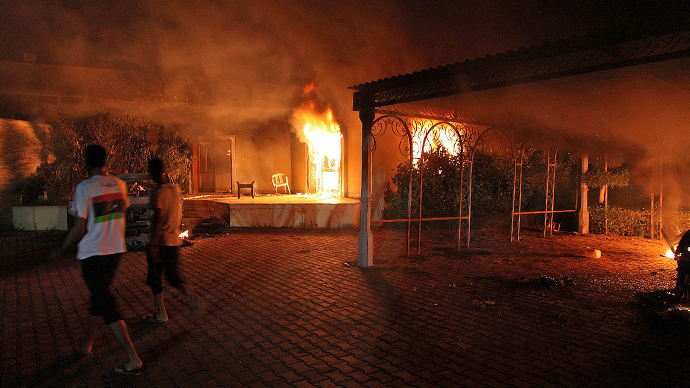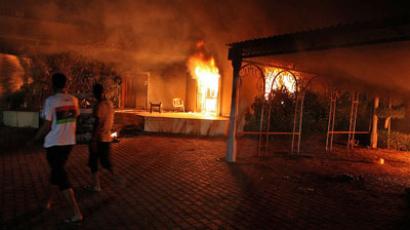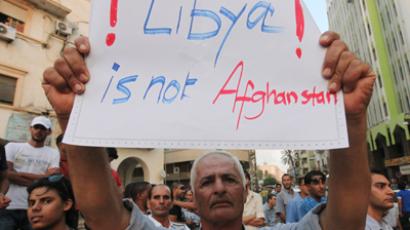Benghazi attack resulted from US 'allowing arms deliveries' to militants

The deadly attack on US diplomatic facilities in Benghazi, Libya, could have been prevented if Washington had not allowed arms shipment to reach al-Qaeda-linked militants, said a group launched to unearth truth behind the 2012 ordeal.
“The White House and senior Congressional members deliberately and knowingly pursued a policy that provided material support to terrorist organizations in order to topple a ruler [Muammar Gaddafi] who had been working closely with the West actively to suppress al-Qaeda,” the Citizens Commission on Benghazi (CCB) said in an interim report released Tuesday.
As a result of such policy, there has been “utter chaos” in Libya, across North Africa and beyond, “the spread of dangerous weapons (including surface-to-air missiles), and the empowerment of jihadist organizations like al-Qa’eda and the Muslim Brotherhood,” the group said in the document, entitled “How America Switched Sides in the War on Terror.”
The commission, set up last year by US center-right press watchdog Accuracy in Media (AIM), is comprised of retired senior military officers and CIA insiders and experts. Its goal is to answer the remaining questions about the September 11, 2012 attack on the diplomatic compound in Benghazi that killed four Americans, including Ambassador Christopher Stevens.
Following a seven-month review of the bloody incident, the Commission blamed the Obama administration for failing to prevent a multi-million dollar United Arab Emirates weapons shipment from getting into hands of al-Qaeda-linked militants.

“The United States switched sides in the war on terror with what we did in Libya, knowingly facilitating the provision of weapons to known al-Qaeda militias and figures,” Clare Lopez, a member of the commission and a former CIA officer, told the MailOnline.
Lopez claimed that the weapons that came into the city of Benghazi “were permitted to enter” by American armed forces who were blockading the approaches from air and sea.
“They were permitted to come in. ... [They] knew these weapons were coming in, and that was allowed,” she said. “The intelligence community was part of that, the Department of State was part of that, and certainly that means that the top leadership of the United States, our national security leadership, and potentially Congress – if they were briefed on this – also knew about this.”
Now all those arms are in Syria, according to another commission member, Retired Rear Admiral Chuck Kubic.
Talking to journalists on Tuesday, he noted that Gaddafi, Libya’s overthrown and killed leader, “was not a good guy, but he was being marginalized.”
According to the commission findings, shortly after the beginning of the Libyan uprising in February 2011, Gaddafi “offered to abdicate.” However, Washington, “ignored his calls for a truce,” the group wrote, which led to extensive loss of life – including the four Americans – chaos, and detrimental outcomes for U.S. national security objectives across the region.
“We had a leader who had won the Nobel Peace Prize,” Kubic said, “but who was unwilling to give peace a chance for 72 hours.”
On March 21, 2011, the US Army General Carter Ham, who was leading the American forces enforcing a no-fly zone over Libya, said that attacking Gaddafi was not part of the mission.
That, Kubic noted, was a signal to the Libyan leader that there was a chance for a deal.
“By 22 March 2011, Qaddafi verifiably had begun to pull his forces back from key rebel-held cities such as Benghazi and Misrata. Word was passed that he wanted a way out of the crisis and was willing to step down and permit a transition government to take power in his stead,” the report said.

In exchange for the stepping down, Gaddafi reportedly wanted permission to continue fighting al-Qaeda in the Islamic Maghreb (AQIM) – the north-African wing of the terrorist organization. The second condition was the lifting of the sanctions against Gaddafi himself, his family members and people loyal to him.
However, the CCB said, despite the willingness of both the US Army General and the Libyan leader to pursue the possibility of truce talks, “permission was not given to Gen. Ham from his chain of command in the Pentagon and the window of opportunity closed.”
The Obama Administration and the National Security Staff did not immediately respond to questions about the commission's findings, the Daily Mail reported.
“We don't claim to have all the answers here,” Roger Aronoff, AIM’s editor told journalists. “We hope you will, please, pursue this. Check it out. Challenge us,” he added.
The Commission’s findings are based on information they got from interviews with “several knowledgeable sources,” they said. As part of the investigation, the CCB along with AIM have also filed 85 document requests under the Freedom of Information Act. The requests were addressed to the Department of State, Department of Defense, CIA and FBI.














